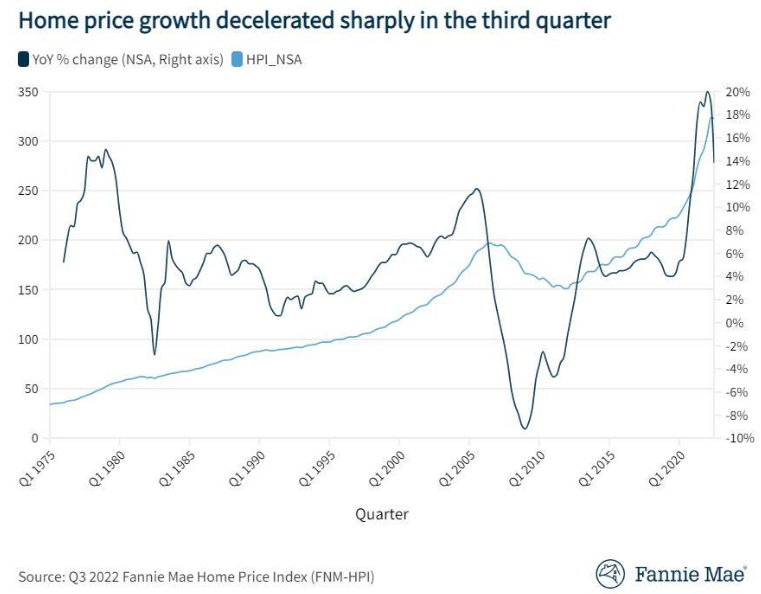Too-Hawkish Fed Stoking Recession Fears
Federal Reserve Chairman Jerome Powell gave a downbeat outlook for investors at the most recent press conference after the Federal Open Market Committee (FOMC) meeting.
“We continue to anticipate that ongoing increases will be appropriate in order to attain a stance of monetary policy that is sufficiently restrictive to return inflation to 2 percent over time,” Powell said. “In addition, we are continuing the process of significantly reducing the size of our balance sheet. Restoring price stability will likely require maintaining a restrictive policy stance for some time.”
This approach of “damn the data, full tightening ahead” policy has Wall Street very concerned monetary policy isn’t seeing the forest for the trees — consumed in the details of a labor market at the expense of embracing the whole situation of ever-weakening economic conditions that are spreading. The perplexing thing is that Jay Powell laid out in the Fed’s policy statement the very areas where rapid deceleration of growth is underway, with consumer spending, the housing market, lower factory and industrial output and capital investment all slowing.
Powell continued, “The U.S. economy has slowed significantly from last year’s rapid pace. Growth in consumer spending has slowed from last year’s rapid pace, in part reflecting lower real disposable income and tighter financial conditions. Activity in the housing sector has weakened significantly, largely reflecting higher mortgage rates. Higher interest rates and slower output growth also appear to be weighing on business fixed investment.”
The fixation on the labor market is a byproduct of too many unfilled jobs due to a worker shortage in a post-COVID economy where millions of skilled workers never re-entered the workforce. Early retirement accounted for almost half of those leaving the workforce. Caregiving has absorbed great numbers of re-entering the labor markets, and multitudes of folks have started their own businesses, leaving small, medium and large corporations scrambling to fill essential vacancies.
Powell then said, “Although job vacancies have moved below their highs and the pace of job gains has slowed from earlier in the year, the labor market continues to be out of balance. The inflation data received so far for October and November show a welcome reduction in the monthly pace of price increases. But it will take substantially more evidence to give confidence that inflation is on a sustained downward path.”
And this is right where Wall Street is shouting to the Fed to “give it a rest already!” Give the seven rate hikes in 2022 a chance to work through the economy. Last week’s economic data should send a loud and clear message that all the front-end loading of rate hikes is already having a material impact on growth. The Consumer Price Index (CPI) Index came in below forecast, as did data on retail sales, Philly Fed Index, Empire State Manufacturing and industrial production.

Source: www.bls.gov
The only thing that seems out of balance is the army of so-called scholars at the Federal Reserve that failed to take inflation seriously in the early going, letting it mushroom, reacting too late and now binging on rate hikes. Current Fed policy appears way too impatient in an economy where 70% of gross domestic product (GDP) is tied to consumer-driven spending. Total debt jumped by $351 billion for the third quarter, the largest increase since 2007. Collective household debt reached a record $16.5 trillion, an increase of 2.2% from the previous quarter and 8.3% from a year ago. The biggest contribution to that debt came from mortgage balances, which rose $1 trillion from a year ago to $11.7 trillion.
Credit card debt climbed to $930 billion. Total credit card balances rose more than 15% from a year ago, marking the largest annual jump in more than 20 years. According to New York Fed officials, the increase in credit card debt “towers over the last 18 years of data.” Total U.S. household debt now exceeds $16 trillion as consumers contend with the higher cost of living while also trying to maintain their lifestyles.
It stands to reason that based on current data, where household debt has soared and savings have tanked, overall consumer spending will contract significantly in 2023. According to data from the Federal Reserve Bank of St. Louis, the personal savings of Americans totaled $626 billion in Q3 of 2022, marking a substantial 87% drop from the $4.85 trillion in Q2 of 2020. Savings are now below even pre-pandemic levels. This data point within itself is alarming and implies not only dramatically slower spending growth ahead, but also a slashing of household expenses to meet budget.
The Personal Savings Rate is down to just 2.3%. It is hard to see how the Fed can keep beating the drum on future rate hikes when household debt has soared to record highs, personal savings have been depleted by 87%, households are barely putting any money away and retail sales are sliding fast. From an economic perspective, the question of whether the Fed is going to overtighten is not a matter of if, but by how much. Thankfully, the next Federal Open Market Committee (FOMC) meeting isn’t scheduled until Feb. 1. So, the data between now and then will have a chance to prove that seven rate hikes has more than done the job of defusing inflation. We’ll see, but this is exactly the message both the bond and stock markets are sending — loud and clear.

